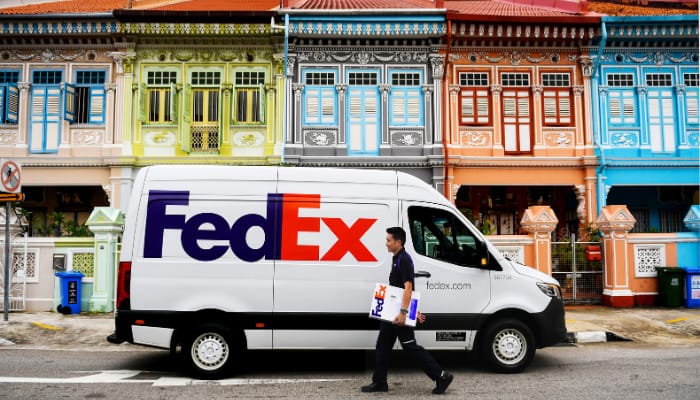Small and medium enterprises (SMEs) have long been the driving force behind economic growth, especially in the Asia-Pacific (APAC) region, where they dominate the business landscape. Yet their strength in number is not the only thing they need to thrive.
Complexities often loom over SME operations, hindering further growth. For one, the business-to-business (B2B) and business-to-business-to-consumer (B2B2C) markets can be an elaborate web difficult to traverse.
FedEx, a transportation, e-commerce, and business services provider, has made it its mission to empower SMEs through its operations.
In MARKETECH APAC’s latest What’s NEXT in Marketing interview, Salil Chari, FedEx’s senior vice president of marketing and customer experience in Asia Pacific, details how the company is transforming its trade and SMEs alongside it.
Supercharging the ‘backbone of economic growth’
As an advocate of the small business community, FedEx recognises how it is the backbone of economic growth in APAC, making it a priority in its mission.
“With SMEs accounting for 90% of businesses, 50% of employment, and 40% of national GDP in emerging economies, supporting their growth is not just a focus for us—it’s a priority,” Salil said.
To support the sector, FedEx leads the transformation within its network to power global trade with a data-driven approach while leveraging technology. It aims to make its network efficient, streamlining its shipping process and allowing real-time tracking. FedEx also allows for flexibility in deliveries, adapting to changing demands. Additionally, it leverages advanced and data-driven insights into its platform, ‘FedEx Surround® and SenseAware ID, which ensures transparency for businesses on their shipments.
“By optimising operations and creating a resilient infrastructure, we’re reshaping how
we work to deliver exceptional customer experiences. Our vision is clear: to make supply chains smarter for everyone,” Salil said.
Beyond logistics, FedEx has also tapped into funding with its FedEx Small Business Grant Program, which is tailored for innovative entrepreneurs who want to grow their businesses.
“Additionally, resources like the FedEx Small Business Center and FedEx Business Insights provide expert guidance with practical tips, and insights to SMEs looking to navigate market complexities, and business challenges,” Salil said.
Navigating B2B, B2BC markets
SMEs seeking expansion would find significant opportunities in tapping global B2B and B2B2C markets, Salil said.
“With B2B commerce projected to surpass $20.9 trillion by 2027 and global trade growing at 4% annually, SMEs are well-positioned to leverage these trends. FedEx supports them with the tools, expertise, and technology to navigate global markets confidently,” he explained.
Expanding beyond local borders is undoubtedly complex, as SMEs must consider custom regulations, logistics, and costs. However, Salil shares how FedEx can simplify these concerns.
“In B2B markets, where high-volume shipments and reliability are critical, FedEx ensures timely, efficient deliveries through its global network spanning over 220 countries and territories,” Salil said.
“Whereas in B2B2C markets, speed and flexibility are key to meeting customer expectations. FedEx® International Connect Plus (FICP) offers cost-effective shipping between APAC, the U.S., and Europe within one to three business days, helping SMEs compete in a fast-paced e-commerce environment,” he added.
FedEx also enhances its customers’ experiences by allowing them to personalise and customise delivery times and locations depending on their needs.
“Consumers can manage their deliveries directly through platforms like WhatsApp or WeChat, offering flexibility and ease. By combining a robust global network, advanced logistics solutions, and personalised delivery options, FedEx enables SMEs to build trust, strengthen relationships, and succeed in today’s competitive global marketplace,” Salil said.
Strengthening digital-first strategy
At the centre of FedEx’s strategy to streamline and optimise its operations to empower SMEs is digital transformation. Salil shares how SMEs, particularly in Asia, are investing more in technologies that improve their performance through digital solutions.
“Digital transformation can be a game changer for small businesses. While startups are often tech-savvy, smaller firms sometimes face challenges in navigating the complexity and cost of tech investments. However, technology is a great enabler, offering these businesses the tools to generate value quickly,” Salil said.
“We’re evolving into a digitally led company, leveraging the value of data alongside our extensive physical network. This dual focus allows us to help SMEs transform their operations by offering digital tools and platforms that are easy to integrate into their existing systems,” he added.
Salil also shared how FedEx was able to deliver real-time intelligence to its customers through investments in artificial intelligence and machine learning. These tools also help businesses across all phases of their operations.
“Digital transformation doesn’t have to be complex. By collaborating with logistics experts like FedEx, SMEs can access expertise and digital solutions to simplify their operations, enhance performance, and unlock growth opportunities in international markets. It’s about helping businesses build a bridge between the physical and digital, driving sustainable success and enabling them to thrive in an increasingly competitive landscape,” Salil said.
Through its commitment to empowering SMEs, FedEx has not only optimised its network but extended its impact to the businesses it works with. While FedEx strengthens its logistics, SMEs are also able to tap into digital strategies, unlocking opportunities for further growth.




